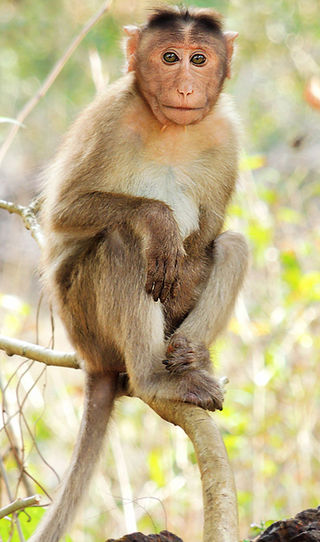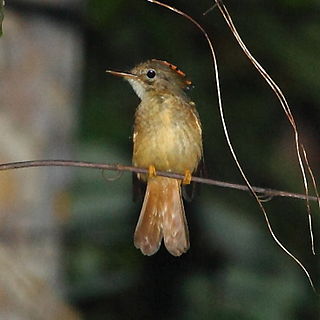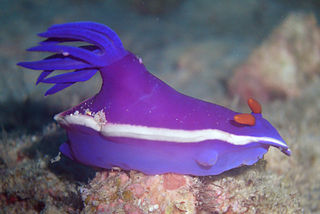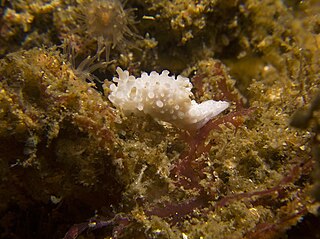
The macaques constitute a genus (Macaca) of gregarious Old World monkeys of the subfamily Cercopithecinae. The 23 species of macaques inhabit ranges throughout Asia, North Africa, and Europe. Macaques are principally frugivorous, although their diet also includes seeds, leaves, flowers, and tree bark. Some species such as the long-tailed macaque will supplement their diets with small amounts of meat from shellfish, insects, and small mammals. On average, a southern pig-tailed macaque in Malaysia eats about 70 large rats each year. All macaque social groups are arranged around dominant matriarchs.

The guenons are Old World monkeys of the genus Cercopithecus. Not all members of this genus have the word "guenon" in their common names; also, because of changes in scientific classification, some monkeys in other genera may have common names that include the word "guenon". Nonetheless, the use of the term guenon for monkeys of this genus is widely accepted.

The royal flycatchers are a genus, Onychorhynchus, of passerine birds in the family Tityridae.

Bothriospondylus is a dubious genus of neosauropod sauropod dinosaur. It lived during the Late Jurassic in England, and the type and only species is B. suffosus.

Limapontiidae is a taxonomic family of small to minute sacoglossan sea slugs. These are marine opisthobranch gastropod mollusks.
The Synergistota is a phylum of anaerobic bacteria that show Gram-negative staining and have rod/vibrioid cell shape. Although Synergistota have a diderm cell envelope, the genes for various proteins involved in lipopolysaccharides biosynthesis have not yet been detected in Synergistota, indicating that they may have an atypical outer cell envelope. The Synergistota inhabit a majority of anaerobic environments including animal gastrointestinal tracts, soil, oil wells, and wastewater treatment plants and they are also present in sites of human diseases such as cysts, abscesses, and areas of periodontal disease. Due to their presence at illness related sites, the Synergistota are suggested to be opportunistic pathogens but they can also be found in healthy individuals in the microbiome of the umbilicus and in normal vaginal flora. Species within this phylum have also been implicated in periodontal disease, gastrointestinal infections and soft tissue infections. Other species from this phylum have been identified as significant contributors in the degradation of sludge for production of biogas in anaerobic digesters and are potential candidates for use in renewable energy production through their production of hydrogen gas. All of the known Synergistota species and genera are presently part of a single class (Synergistia), order (Synergistiales), and family (Synergistaceae).

Hypselodoris is a genus of colourful sea slugs or dorid nudibranchs, marine gastropod mollusks in the family Chromodorididae. Modern usage follows a more restricted view of which species belong in this genus so there are numerous genus transfers.

Glossodoris is a genus of sea slugs, dorid nudibranchs, shell-less marine gastropod mollusks in the family Chromodorididae.

The Facelinidae are a taxonomic family of colorful sea slugs. These are specifically aeolid nudibranchs. They are marine gastropod molluscs.

Thordisa is a genus of sea slugs, dorid nudibranchs, shell-less marine gastropod mollusks in the family Discodorididae.

Phyllidiopsis is a genus of sea slugs, dorid nudibranchs, shell-less marine gastropod molluscs and is the largest genus within the family Phyllidiidae.

Costasiella is a genus of sacoglossan sea slugs, a shell-less marine opisthobranchid gastropod mollusk in the family Costasiellidae.

Aegires is a genus of sea slugs, dorid nudibranchs, marine gastropod mollusks in the family Aegiridae. Species within this genus feed exclusively on calcareous sponges.

Mangelia is a large genus of sea snails, marine gastropod mollusks in the family Mangeliidae.

Berthella is a genus of sea slugs, marine gastropod mollusks in the family Pleurobranchidae.
Limapontia capitata is a species of sacoglossan sea slug, a shell-less marine opisthobranch gastropod mollusk in the family Limapontiidae.
Occidenthella is a genus of sea slugs, specifically aeolid nudibranchs, in the family Flabellinidae. The only described species is Occidenthella athadona, a combination named in 2017. It was originally described as Coryphella athadona in 1875. The genus name Occidenthella, from occidens, meaning "west" in Latin, refers to its distribution in the Western Pacific Ocean.
Rivularia is a genus of freshwater snails with a gill and an operculum, aquatic gastropod mollusks in the family Viviparidae. Species in this genus is distributed only along the Xiang River region of Hunan province, People's Republic of China.
Hyalocylis striata is a species of Hyalocylis, a pteropod. It is a gastropod mollusk.













